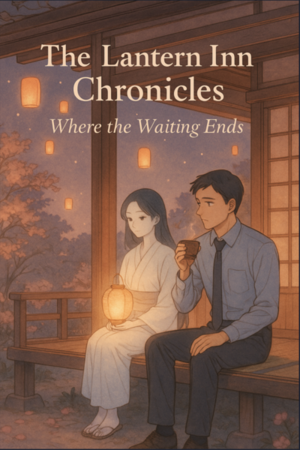Chapter 13:
The Sister Who Stopped Calling
Lantern Inn Chronicles
That evening, the wind over the hills arrived earlier than usual — brisk, biting, and full of something unsaid. Even the lanterns that lined the cobblestone path outside the inn shivered in their glass frames, as if bracing for the weight of an arrival that wasn’t quite ready to be received — or forgiven.
Kaito stood in the front hall, quietly polishing the bell at the reception table. He wasn’t expecting a guest, not this late. Not with the air hanging thick with old things — grief, memory, unfinished prayers.
The door creaked open.
And time — just for a moment — forgot how to move.
She stepped in.
And the silence around her followed like a coat she couldn’t take off.
Her presence was unmistakable. Even after all these years, she hadn’t changed in the ways that mattered. Her eyes were still sharp, as if every glance held a question and a judgment. Her posture was still hurried, like she was already late for something important. She wore a long trench coat that clung to her like the rain — damp at the shoulders, splattered with mud around the hem. Her shoes had collected the dust of a road she clearly hadn’t wanted to walk.
But her face.
Her face had changed.
There were shadows there now — not just from the lanternlight, but from the past. The kind of shadows that settle under the eyes when you’ve spent too long staring at empty chairs, unanswered messages, and the kind of silence that doesn’t just come from outside, but from the slow erosion of faith in someone you once loved.
She didn’t look up at first.
Her fingers gripped the small slip of parchment she’d been given outside the inn’s gate — the name that had been waiting for her, even before she had admitted she was ready to hear it.
Aya Moriyama, it read.
Kaito felt his throat close around a name he hadn’t heard in years.
His little sister.
The one who used to braid her hair on the train to school and flick him on the forehead when he spaced out. The one who screamed at him through the bathroom door when he missed dinner. The one who stopped calling after their father’s funeral. The one who had said the last word in their last conversation.
“You never say anything until it’s too late. And I’m tired of waiting for a brother who never arrives.”
But she had arrived now.
Not in a memory.
Not in a letter with no return address.
Not in a dream blurred by sleep.
She was here. In the flesh. In the doorway of a place where only those lost between worlds tended to knock.
Aya’s voice cracked — not just from emotion, but from years of words held back, choked down, swallowed in silence and shame.
“Can I…” she hesitated, each word fragile as frost. “Can I ask if a man named Kaito is here?”
Kaito stood still.
Not from fear, nor surprise — but from a kind of soul-deep stillness that wrapped around the moment like a shroud. His feet might as well have been nailed to the wooden floorboards of the inn. Every breath felt like it might disturb the delicate edge of something sacred. As if this sliver of time would dissolve if he dared to speak too soon.
Across from him, the woman in the rain-damp coat didn’t look up.
Not yet.
She clutched the name-slip like a lifeline, as though afraid it might vanish if she let go. Her fingers trembled, knuckles white from cold or from the weight of everything she hadn’t said in years.
Reika appeared beside him — quietly, gently, like mist pooling over stone. She didn’t need to ask what was happening. She could read the ache in Kaito’s silence, the tremor in the stranger’s voice. Her presence was neither intrusive nor passive. It was simply… there. The way the moon is there for the tide.
Her voice was low, reverent.
“He’s here,” she said. “Would you like to see him?”
The woman — Aya — finally lifted her eyes.
And when they met Kaito’s, time folded in on itself.
In that instant, the decades of absence were still real — but not insurmountable. The pain didn’t vanish, but it softened. For one heartbeat, they were no longer adults held hostage by grief and distance. They were simply a boy and a girl who once shared a room with bunk beds, late-night arguments, and the quiet bond of survival.
Aya’s lips parted.
“I thought—” she began, then faltered, as if the sentence had fractured halfway down her throat.
Kaito didn’t speak at first. He studied her — not with disbelief, but with a kind of breathless reverence. Her hair was longer now, streaked with grey. Her eyes, once so quick and cutting, now bore a gentler tiredness. But the fire was still there. Diminished, perhaps. But not gone.
His voice emerged slowly, like a forgotten melody returning after years of silence.
“You brought Dad’s umbrella.”
She blinked.
Then followed his gaze to the worn leather handle peeking out of her bag — frayed at the edges, the color faded from too many rainy seasons.
“He always said you should carry it,” she murmured, half in memory, half in apology.
Kaito gave a crooked smile — small, but real.
“I never did.”
“I know,” she said, the corners of her mouth twitching upward. “You never listened. Not really.”
“That was your job,” he said quietly. “To keep yelling when I went quiet.”
And for a long moment, neither of them moved.
The fire crackled softly in the hearth nearby, the only sound in the room. Even Riku, ever the reliable clatter of pots and spoons in the kitchen, had gone still — as if the entire inn itself was holding its breath.
They sat down by the flames. No ceremony. No declarations. Just proximity — the kind that could only come from a wound shared long enough to scar in sync.
Aya studied Kaito like she wasn’t sure who — or what — she was seeing.
His face was thinner. The kind of thin that comes not from lack of food, but from too many years spent carrying invisible weight. There were faint lines around his eyes — not laugh lines, but something quieter. A kind of weathering. Like stone softened by years of rain.
The streaks of silver in his hair weren’t dramatic, but they shimmered when the fire caught them. He held himself differently now — straighter, but not rigid. Less like someone defending himself, more like someone finally resting.
“When the police called,” Aya said at last, voice low, “they said your body was found at 2 a.m. Still in your office. They thought you were asleep at first.”
Kaito nodded, his hands folded neatly in his lap.
“It was quiet,” he said. “Like most of my life.”
FlashbackA sidewalk glistening with rain.
Outside a narrow crematorium in the outskirts of the city.
Kaito, 25. Aya, 20.
Their parents’ ashes in a single urn between them. A silence thick enough to smother words.
Aya wore black. Kaito wore gray.
Neither reached for the other.
Neither said goodbye.
The wind didn’t move that day — as if even it didn’t know how to speak into their grief.
“I hated you,” Aya whispered now. Her voice didn’t tremble. It cracked — like ice beneath boots.
“I know.”
“But not because you disappeared. I hated you because you never let me see you hurt.”
Kaito looked into the fire.
“You were grieving. I didn’t want to add more weight.”
She shook her head.
“You didn’t have to carry mine. You just had to let me carry yours.”
She reached into her coat, fingers fumbling.
Then pulled out something small — old, scratched, but carefully preserved.
A plastic train keychain. Pale blue. The paint chipped from years of being tossed between bags, moves, cities, lives.
“Remember this?” she asked.
Kaito’s breath hitched.
Their first trip to the countryside. She had begged him to buy matching ones. He had lost his years ago.
“I’ve carried it every day since. Even after I stopped calling. Even after I tried to forget you.”
She placed it gently on the table between them.
It glowed faintly in the firelight.
Kaito didn’t cry.
But something in his chest shifted — not like breaking, but like a locked door finally creaking open.
“You don’t have to go yet,” he said, voice quiet as snowfall.
Aya looked at him — truly looked — and smiled.
“I know. But maybe… maybe you do.”
He met her eyes.
“Why?”
“Because I think you’ve been waiting for me. This whole time. And I’ve kept you here. Without knowing it.”
Neither said anything for a while.
And then, Reika moved silently through the room, lit the lantern outside Room Nine, and bowed her head.
The flame flickered once.
Then steadied.
Aya’s gaze lingered on it.
“Will I see you again?”
Kaito smiled — not wistfully, but with something softer. A knowing.
“This inn doesn’t close. Not even when the doors do.”
She rose.
Walked to him.
And, for the first time in decades, she embraced her brother.
Not out of guilt.
Not out of grief.
But out of something newly born — something fragile, forgiving, and free.
“I’m sorry,” she whispered.
“Me too,” he said.
“You were never invisible.”
She stepped into the hallway and paused at Room Nine.
The lantern glowed beside her, silent and steadfast.
She didn’t look back.
She didn’t need to.
And as the door closed gently behind her, the flame stayed lit — not dim, not fading.
Just steady.
A final proof that some goodbyes aren’t endings.
They’re beginnings.




Please sign in to leave a comment.